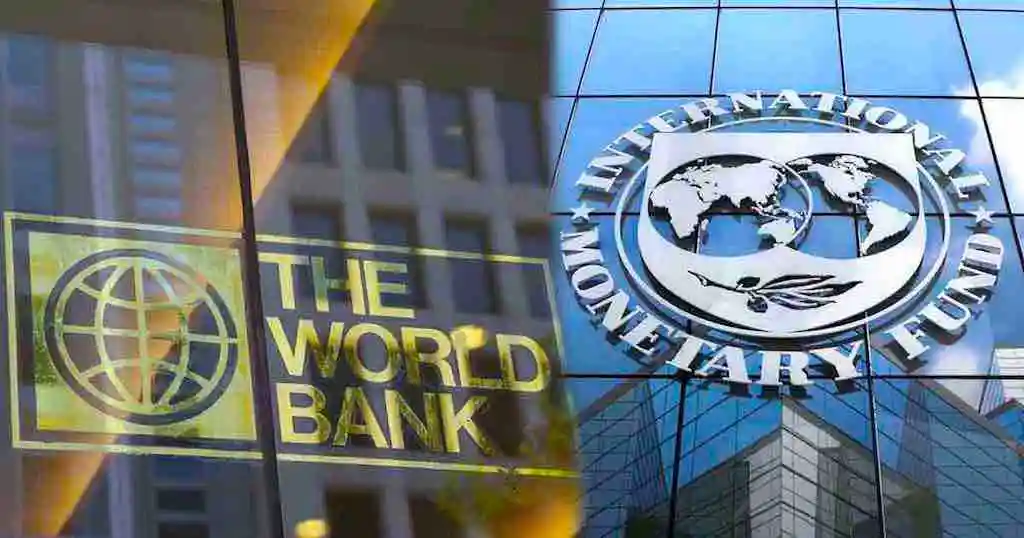The 2025 Spring Meetings of the International Monetary Fund (IMF) and the World Bank are underway in Washington, D.C., against the backdrop of escalating global trade tensions and increasing doubts over the future of multilateral cooperation.
Sources, on ground are in the U.S. capital to provide comprehensive coverage of these high-stakes discussions and their implications.
This year’s meetings are taking place amid heightened concerns over the global economic landscape, largely driven by the continued fallout from the United States–China tariff war. The situation intensified earlier this month when former U.S. President Donald Trump imposed a steep 134% tax on Chinese imports, branding the move as part of his “Liberation Day” policy that also instituted a baseline 10% levy on imports from nearly all U.S. trading partners.


In response, China raised tariffs on American goods to as much as 125%, signaling a deepening trade standoff between the world’s two largest economies.
While Trump later announced a 90-day suspension on retaliatory tariffs for 60 countries—including Nigeria—China remains excluded from the temporary relief. Nonetheless, the 10% minimum tariff continues to apply globally. Trump has defended the measures as necessary to promote domestic production, boost tax revenue, and spur investment—though many experts challenge those claims.
As the largest shareholder in the IMF, the United States holds 16% of the total votes—enough to wield veto power on critical decisions that require 85% approval. This influence looms large over the proceedings.
The meetings, which bring together finance ministers and central bank governors from around the world, officially began on Monday. IMF Managing Director Kristalina Georgieva has previously cautioned that escalating tariffs represent a “significant risk to the global outlook.”


Echoing that sentiment, WTO Director-General and former Nigerian Finance Minister Ngozi Okonjo-Iweala warned that the current wave of protectionist trade policies could shrink global merchandise trade volumes by as much as 1% this year.
Among the key speakers and panelists are IMF First Deputy Managing Director Gita Gopinath, who will deliver opening remarks, and IOSCO Chair Jean-Paul Servais, who will close the sessions. Other notable participants include World Bank President Ajay Banga; former Chilean President Michelle Jeria; Singaporean President Tharman Shanmugaratnam; Grab CEO Anthony Tan; and Nigeria’s own Rania Al Mashat, among others.
Nigerian Outlook
For Nigeria, the meetings offer a crucial opportunity for economic diplomacy. Finance Minister Wale Edun and Central Bank Governor Olayemi Cardoso are expected to engage with global investors and multilateral institutions to shore up support amid ongoing global volatility.
Last week, the IMF published its 2025 Article IV Consultation report on Nigeria, praising the country’s post-2023 economic reforms for strengthening resilience to external shocks. The report followed consultations with key stakeholders during an IMF team’s visit to Lagos and Abuja earlier this month.
Minister Edun has downplayed the potential impact of new U.S. tariffs on Nigeria, citing the country’s reliance on crude oil and mineral exports—products currently exempt from American trade sanctions.

“It’s not too bad,” Edun said at a recent Corporate Governance Forum in Abuja. “Oil minerals are excluded by America from being in any way sanctioned with tariffs.”
However, falling oil prices remain a critical concern. With Nigeria’s 2025 budget based on a $75 per barrel benchmark, recent dips below $70 threaten to upend fiscal projections. Analysts at Goldman Sachs forecast that Brent crude could slide to the low-to-mid $60s by late 2026 if supply increases from OPEC and its allies.
As a result, Nigerian officials are expected to hold strategic talks on investment flows, oil revenue stabilization, and long-term economic planning during the course of the meetings.




